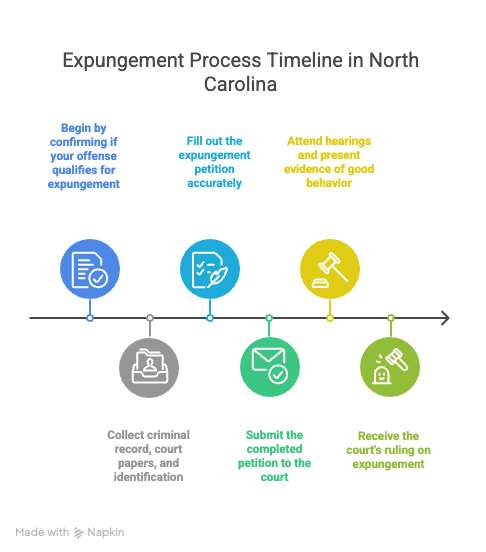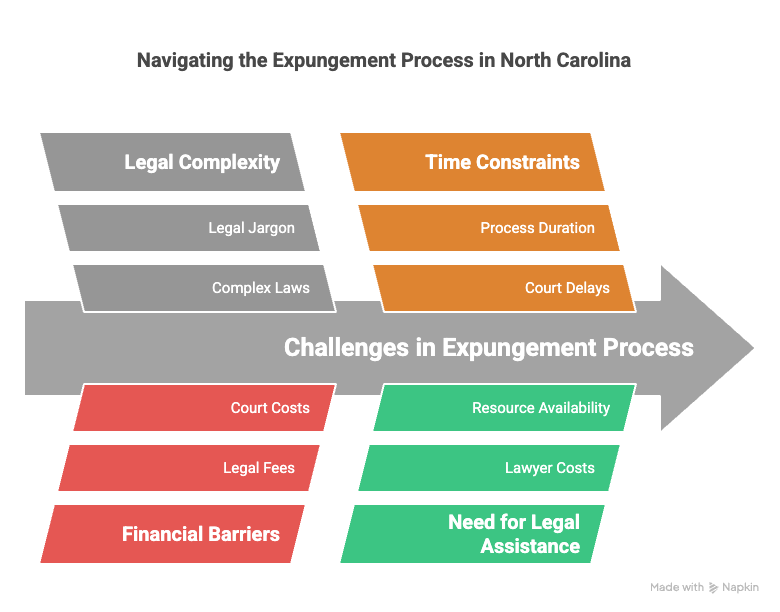Having a criminal record can pose significant obstacles to finding employment. Fortunately, the state of North Carolina offers pathways to expunge or remove certain offenses from your record. This guide will dive into North Carolinaâs expungement laws, shedding light on how they can help individuals clear their records and enhance their employment prospects. Whether you're directly affected by these laws or youâre an employer seeking to understand how they work, this comprehensive guide will provide you with valuable insights.
Key Takeaways
- Expungement laws in North Carolina can help remove certain criminal records, improving your job opportunities.
- The NC Second Chance Act allows for the expungement of non-violent misdemeanors and some felonies, making it easier to clean up your record.
- Automatic expungement of certain dismissals and acquittals helps you move forward without lengthy paperwork.
- To start the expungement process, confirm your eligibility, gather documents, and file a formal petition with accurate details.
- Though the expungement process takes time and may involve costs, the potential to remove employment barriers makes it worthwhile.
Introduction
A criminal record can be a significant roadblock on the path to employment. Many employers perform background checks, and a record may cause them to think twice about offering you a job. That old mistake might stand in the way of your career goals. In North Carolina, though, there is a pathway to change this trajectoryâexpungement laws.
These laws can remove certain offenses from your record, paving the way for better job opportunities. The stateâs expungement laws aim to give individuals a clean slate. Whether you're someone with a record looking to better your chances in the job market, or an employer trying to grasp how these laws affect hiring, understanding North Carolina's expungement laws is crucial.
This article explores the ins and outs of these laws. You'll learn about the NC Second Chance Act, find out which records are eligible, and discover recent developments like automatic expungement. Dive into how these laws work to clear records and enhance employment prospects.
Understanding Expungement in North Carolina
Expungement is the legal process that allows you to remove certain criminal records from public view. Think of it like clearing out old clutter, but with your record. It won't erase your past, but it stops it from being a hurdle in your future. When you're applying for a job, an expunged record shouldn't be held against you. This can be a game-changer for employment opportunities.
In North Carolina, not all records are eligible for expungement. Here, expungement mainly covers misdemeanors and some lower-level felonies. Misdemeanors like first-time offenses committed under the age of 18, or non-violent felonies committed under 18, are often eligible. For adults, certain non-violent misdemeanors and Class H or I felonies might qualify after a set period. Keep in mind, the state's laws regarding eligibility are not static and can change based on legislative adjustments.
Understanding what qualifies is crucial. Does your record include offenses that fall under these categories? If so, you might have the opportunity to clear your record and improve your chances at employment. Expungement provides a legal reset, but itâs essential to verify if your situation meets the criteria. If you're unsure, consulting a legal expert can be a wise step. Start by asking yourself, how might clearing an old record open new doors?
North Carolina Expungement Laws
The NC Second Chance Act opened new doors for people seeking expungement. It offers a lifeline to those with certain misdemeanors and felonies. This act targets non-violent crimes and provides clear criteria for eligibility. If your charge resulted in a dismissal or you were found not guilty, you might benefit from this act. It also allows for the expungement of certain juvenile records and older convictions under specific conditions. As a result, many individuals now find it easier to clean up their records without the hassle of a lengthy process.
Automatic expungement is another step forward. This recent development means that certain dismissals and acquittals are wiped from your record without additional paperwork. This move aims to streamline the process and lessen the burden on the court system, removing barriers to employment faster. Automatic expungement also highlights a shift towards a more progressive approach in handling minor offenses. Keep in mind, however, that this doesn't apply to every case. You should verify if your situation qualifies for automatic expungement.
These updates are more than just legal changesâthey symbolize a shift in how society views rehabilitation and employment opportunities. Are you or someone you know eligible to finally move forward without the weight of past mistakes? Understanding these laws and taking action could change lives, making it easier to secure employment and stabilize your future.
The Expungement Process in North Carolina
The path to clearing a criminal record in North Carolina involves several straightforward steps. To start, confirm your eligibility. Not every offense qualifies for expungement. Generally, non-violent misdemeanors and certain felonies are eligible, but there are specifics around each case. Check state guidelines or seek legal advice to confirm your case's status.

Once eligibility is clear, you need to gather all relevant documents. These include your criminal record, any court documents, and identification. The next step is completing the petition for expungement. This document formally requests the court to expunge your record. The details must be accurate, so take the time to fill it out correctly. Incomplete or incorrect petitions can cause delays.
After filing the petition, the process involves court hearings. During these sessions, evidence supporting your expungement request is presented. Demonstrating good behavior since the original offense can strengthen your case. This might involve testimony or documentation showing you've followed all legal requirements and made efforts to improve your life.
The entire process from filing to final decision can vary in length. Generally, it takes several months. This timeline can extend depending on the court's schedule and the complexity of your case. Patience and perseverance play a significant role here.
Successfully completing the expungement process means having a clean slate. It's a fresh start that can open doors previously closed. The commitment to this journey reflects a desire for change, growth, and improved prospects in both life and employment. With the right steps and guidance, expungement is more than a legal processâit's a strategic move towards a better future.
Impact on Employment
Expungement can drastically improve your job prospects. Removing a criminal record often opens doors that were previously closed and gives you a fair shot in the hiring process. Employers often see a clean slate as a signal that you're committed to a new path. Without a past conviction surfacing in background checks, your skills and experience take center stage.
For employers, an expunged record means they can focus on your current qualifications, not past mistakes. In North Carolina, hiring after an expungement comes with no legal risks tied to the cleansed offense. This freedom can broaden the pool of talented candidates an employer may consider, positively impacting workforce diversity.
Have you ever wondered what potential employers see about your past? With expungement, there's less stigma and more opportunity. By clearing your record, you're not just removing barriers, but actively shaping a future free of prior misconceptions. Wouldn't you want employers to see you as you are today, rather than who you were?
Challenges and Considerations
Navigating the expungement process in North Carolina can be challenging. One of the main obstacles is understanding the legal landscape. The laws are complex and vary depending on the specifics of each case. You might find yourself grappling with legal jargon and procedures that seem daunting without expert guidance.

Another hurdle involves the costs tied to pursuing expungement. Legal fees, court costs, and potential lost wages from attending court can add up. These financial barriers might discourage some individuals from seeking expungement, even when they're eligible.
It's crucial to consider the impact of time. The expungement process isn't quick. It can take several months from start to finish. You might face delays, especially if the court system is backlogged. This waiting period can be frustrating, particularly if you're eager to improve your employment prospects.
Legal assistance is invaluable in overcoming these challenges. A lawyer can help you understand the nuances of your case, ensure that all paperwork is filed correctly, and represent you in court. While hiring a lawyer adds to the cost, it often makes the process more manageable and increases your likelihood of success.
You can also tap into local resources. Organizations such as Legal Aid of North Carolina provide assistance to individuals who cannot afford private legal counsel. These resources can offer guidance through each step, helping you avoid common pitfalls.
Are you ready to tackle the hurdles and clear your record? Understanding what you might face ahead of time can prepare you for the journey. Getting your record expunged could open doors to new job opportunities and a brighter future.
Additional Resources
When navigating the path to expungement, having the right resources at your fingertips can make a significant difference. Here are some valuable links and resources to guide you through the process:
- For employment guidance and support related to hiring, explore the Department of Labor website. It is a reliable source for understanding various work-related legalities.
- To gain deeper insights into employment-related legal issues beyond expungement, take a look at GCheck's Blog. It covers a broad range of topics, offering useful knowledge for both job seekers and employers.
- If you need specific information on North Carolinaâs expungement process, the North Carolina Judicial Branch provides detailed guidance. Here you can find forms, instructions, and more about eligibility requirements.
- For those seeking legal assistance, Legal Aid of North Carolina offers support to individuals who may qualify for free legal help. This can be especially useful for those who need expert advice but are concerned about the costs of legal services.
Utilizing these resources can ease your journey through the expungement process and help you move toward enhanced employment opportunities. Make sure to explore each source at your own pace to fully understand the intricacies involved.
Frequently Asked Questions (FAQs)
How long does expungement take in North Carolina?
Expungement in North Carolina typically takes between 9 to 12 months, but this can vary depending on the complexity of your case and the court's schedule.
Can employers see expunged records in NC?
No, employers in North Carolina cannot see expunged records. Once a record is expunged, it is removed from public view.
What crimes are ineligible for expungement in NC?
Serious felonies such as violent crimes and certain drug offenses are generally ineligible for expungement in North Carolina.
Does NC expunge dismissed charges automatically?
No, dismissed charges are not automatically expunged. You must file a petition to have them expunged.
How to check if your NC record is expunged?
To verify if your record has been expunged, you can check with the clerk of the court where the expungement was filed or request a copy of your criminal record.
Can you expunge a felony in North Carolina?
Yes, some non-violent felonies can be expunged, but there are specific criteria and waiting periods that must be met.
Do employers have to ignore expunged records in NC?
Yes, employers are required to treat expunged records as though they do not exist.
How much does expungement cost in NC?
The filing fee for expungement in North Carolina is typically around $175, but this may vary depending on the specifics of the case.
Are DUI convictions expungeable in NC?
DUI convictions are generally not eligible for expungement in North Carolina.
Does expungement restore firearm rights in NC?
Expungement does not automatically restore firearm rights in North Carolina. You may need to pursue additional legal actions to restore these rights.
Are records available to law enforcement after expungement?
Yes, expunged records remain accessible to law enforcement agencies and the judicial system for specific purposes.
Can juvenile records be expunged?
Yes, certain juvenile records can be expunged under specific circumstances in North Carolina.
Is a lawyer required for expungement in NC?
No, hiring a lawyer is not required, but it can be beneficial to navigate the legal process effectively.
What happens if there's an error in expungement?
If there is an error, you may need to file a motion to correct it, potentially with the assistance of a legal professional.
Definitions
Expungement
Expungement is the legal process that removes certain criminal charges or convictions from public view. In North Carolina, this can apply to non-violent misdemeanors or felonies under specific conditions. Once your record is expunged, most employers will no longer see that offense on background checks. This can make it easier to apply for jobs, housing, or further education without being judged for past mistakes. Ask yourselfâwould your job prospects improve without that charge on your record?
Background Check
A background check is a review an employer uses to verify your history. It often includes criminal records, credit reports, and employment data. A clear background check can strengthen your job application. If youâve had a record expunged, it generally wonât appear in standard background screenings. However, some government roles may still access sealed records. Have you checked what shows up when employers review your record?
Eligibility
Eligibility means meeting the conditions required to apply for expungement. In North Carolina, this depends on the type of offense, your age at the time, and how much time has passed. For example, a non-violent first-time misdemeanor may qualify after five years. If youâre unsure, talk to a legal expert or use resources to check if your case qualifies. Could your past conviction meet the rules for being cleared?
Hiring
Hiring is the process employers use to find and select candidates for jobs. When reviewing applications, they often look at criminal records. An expunged record gives you a cleaner slate and may help you move past automatic rejections. For employers, hiring someone with a sealed record carries fewer risks since the offense is no longer part of their legal history. Would a cleared record increase your confidence when applying?
Legal Assistance
Legal assistance refers to professional guidance from a lawyer or legal expert. This help is important when applying for expungement, as the rules and paperwork can be complex. In North Carolina, you can also turn to organizations like Legal Aid if you canât afford a private attorney. Having proper legal help can make the process faster and more accurate. Do you know where to go for support if you want your record cleared?
References
- UNC School of Government's 2025 Expunction Guide: https://nccriminallaw.sog.unc.edu/2025-expunction-guide-available-for-free/
- Federal Defense of North Carolina's guide on expungements: https://www.federaldefensenc.com/north-carolinas-second-chance-act-how-criminal-expungements-have-changed/
- North Carolina Collateral Consequences Resource Center: https://ccresourcecenter.org/state-restoration-profiles/north-carolina-restoration-of-rights-pardon-expungement-sealing/
- Background Online's article on North Carolina expungement: https://www.backgroundsonline.com/blog/north-carolina-will-start-expunging-nonviolent-convictions

GCheck Editorial Team
Meet the GCheck Editorial Team, your trusted source for insightful and up-to-date information in the world of employment background checks. Committed to delivering the latest trends, best practices, and industry insights, our team is dedicated to keeping you informed.
With a passion for ensuring accuracy, compliance, and efficiency in background screening, we are your go-to experts in the field. Stay tuned for our comprehensive articles, guides, and analysis, designed to empower businesses and individuals with the knowledge they need to make informed decisions.
At GCheck, we're here to guide you through the complexities of background checks, every step of the way.






